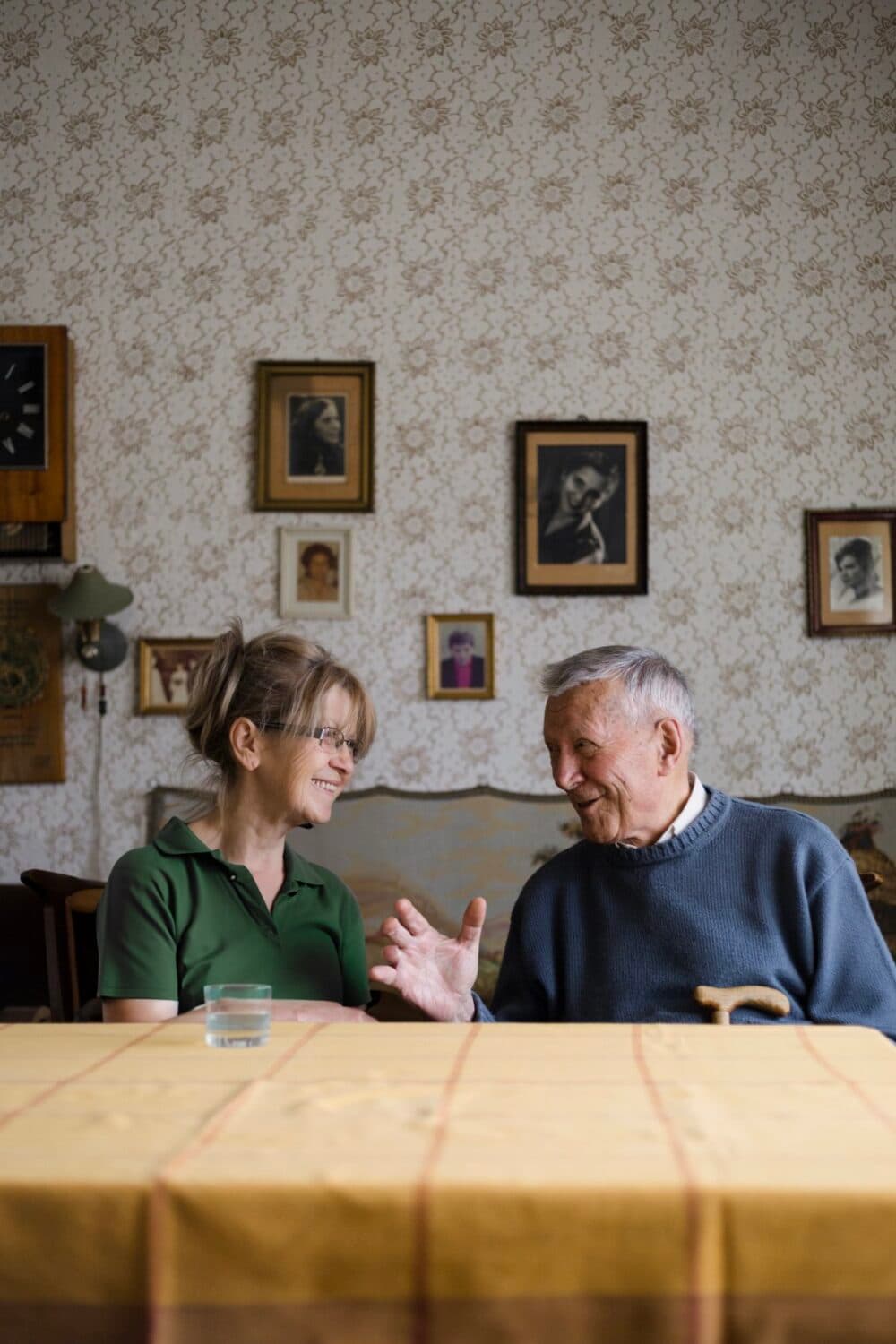Who Pays for Care When a Loved One Has Dementia?

Have you ever wondered who becomes financially responsible when dementia changes someone’s life?
It’s a question more families are asking—quietly, anxiously—especially when a loved one begins to lose the ability to make everyday decisions or manage money. At Home Instead New Forest, we support many families through the emotional and practical journey of dementia care. One of the most common—and often most complicated—areas of concern is financial responsibility.
Caring for someone with dementia goes far beyond offering companionship or assistance with daily tasks. It often means stepping in to handle money, make healthcare choices, and protect that person’s wellbeing when they can no longer do it themselves. So, who takes on those responsibilities, and what steps need to be in place? This blog provides a caring, clear look at what families need to know.

Understanding How Dementia Affects Decision-Making
Dementia is not only a memory condition. It can affect judgment, behaviour, and a person’s ability to carry out basic financial and legal tasks. This often happens gradually. One day someone might forget to pay a bill; months later, they may not recognise a scam phone call or remember their PIN number.
In England and Wales, the Mental Capacity Act provides a legal framework to determine whether someone has the mental capacity to make specific decisions. The law recognises that capacity is task-specific. A person may still decide what they want for lunch, but struggle to understand how to pay a utility bill.
Once someone is judged to lack capacity, decisions about their care and finances may need to be made on their behalf.

What Is a Lasting Power of Attorney?
To prepare for this possibility, many families set up a Lasting Power of Attorney (LPA). This is a legal document that allows someone to appoint another person (or people) to make decisions on their behalf if they lose mental capacity.
There are two types:
- Property and Financial Affairs LPA – Allows the appointed attorney to manage bank accounts, pay bills, sell property, and handle pensions or investments.
- Health and Welfare LPA – Covers decisions about care, medical treatment, and where the person lives.
These documents must be registered while the individual still has capacity. If that window is missed, the family may need to apply to the Court of Protection, which is a longer, more complex and costly legal process.

What Happens Without an LPA?
Without a valid LPA in place, decisions can’t legally be made on someone’s behalf unless the Court of Protection intervenes. The court may appoint a deputy, who is given similar powers to an attorney but is monitored more closely. This is usually reserved for situations where no suitable arrangements were made earlier, or where disputes have arisen.
It’s also possible for the court to appoint a guardian (also known as a deputy for personal welfare). This person becomes legally responsible for making sure the individual’s basic needs—such as safety, healthcare, shelter, and financial matters—are met. However, this process involves court hearings, evidence, and strict oversight.
While guardianship can be necessary in some cases, early planning is almost always easier and less distressing for all involved.

Protecting Someone’s Medical Wishes
Alongside financial and legal planning, some people choose to create a Living Will (also called an Advance Decision). This document allows someone to refuse specific medical treatments in future situations where they’re unable to make or communicate decisions.
For example, a person may choose not to be resuscitated or placed on life support. This can offer clarity for loved ones and healthcare providers during highly emotional moments.
Another option is an Advance Statement, which isn’t legally binding but helps explain someone’s values and care preferences—such as wanting to remain at home or avoiding hospital stays where possible.

Managing Money Safely
One of the more difficult parts of dementia is recognising when someone is no longer safe to manage their finances. Sadly, people with dementia are at much higher risk of falling victim to scams or financial abuse.
Signs that someone may need support with money include:
- Unpaid bills piling up
- Unexplained cash withdrawals
- Unusual spending patterns
- Giving money to unfamiliar people
Families can help protect their loved ones by setting up third-party access on bank accounts (with consent), monitoring transactions, and reporting suspected fraud. An LPA for Property and Financial Affairs can also help prevent serious financial harm.

Financial Help for Carers and People with Dementia
Caring for someone with dementia often means giving up work hours, adjusting routines, and absorbing unexpected costs. Fortunately, several benefits are available:
- Attendance Allowance – For people over State Pension age who need support with personal care.
- Carer’s Allowance – For people who provide care for at least 35 hours a week.
- Council Tax Discounts – May be available for households where someone has a confirmed dementia diagnosis.
- NHS Continuing Healthcare (CHC) – Offers full funding for health-based care needs outside hospital settings.
Your local authority or support organisations like Age UK or Dementia UK can help guide you through the application process.

What If Care at Home Becomes Too Difficult?
Despite best efforts, dementia may reach a stage where care at home is no longer safe or manageable. This could be due to:
- Physical frailty
- Wandering or disorientation
- Aggressive behaviour
- Medical complexity
In these situations, memory care units and dementia-friendly care homes can offer a more structured environment with trained staff. Making this decision is rarely easy, but in some cases, it becomes the kindest option for everyone involved.
At Home Instead New Forest, we often work with families to delay or avoid residential care by providing personalised support at home for as long as possible. When that’s no longer enough, we help ease the transition by offering continuity, guidance, and compassion.

Don’t Forget the Carer’s Needs
Carers often put their own wellbeing last. But no one can provide care on empty reserves. The Carer’s Assessment—offered by your local authority—can open up access to practical help, such as:
- Equipment to make life easier at home
- Respite care to allow rest and recovery
- Home adaptations to improve safety
Emotional support also matters. Support groups, counselling, and dementia cafés can provide understanding, connection, and much-needed breathing space.

Planning Ahead Means Less Stress Later
Financial responsibility for a person with dementia doesn’t land all at once—it accumulates. A forgotten appointment. A missed payment. A worrying diagnosis. When those early signs appear, that’s the moment to begin planning.
Putting the right legal documents in place—especially an LPA—can protect your loved one’s wishes and reduce anxiety down the line. These decisions are rarely easy, but they are manageable, especially with help.
If you’re facing questions about dementia care, we’re here to support you.
Contact Home Instead New Forest for personal, thoughtful advice about caring for someone with dementia in the way that works best for your family. We can support you in maintaining dignity, independence, and safety—at home, for as long as possible.

Areas We Serve
Lymington, Brockenhurst, New Milton, Totton, Lyndhurst & the surrounding areas.
BH23 8, BH24 4, BH25 5, BH25 6, BH25 7, SO40 2, SO40 3, SO40 4, SO40 7, SO40 8, SO40 9, SO41 0, SO41 3, SO41 5, SO41 6, SO41 8, SO41 9, SO42 7, SO43 7, SO45 1, SO45 2, SO45 3, SO45 4, SO45 5, SO45 6
5 Rashley Mews, High St, Lymington SO41 9AR, UK
01590 637 250